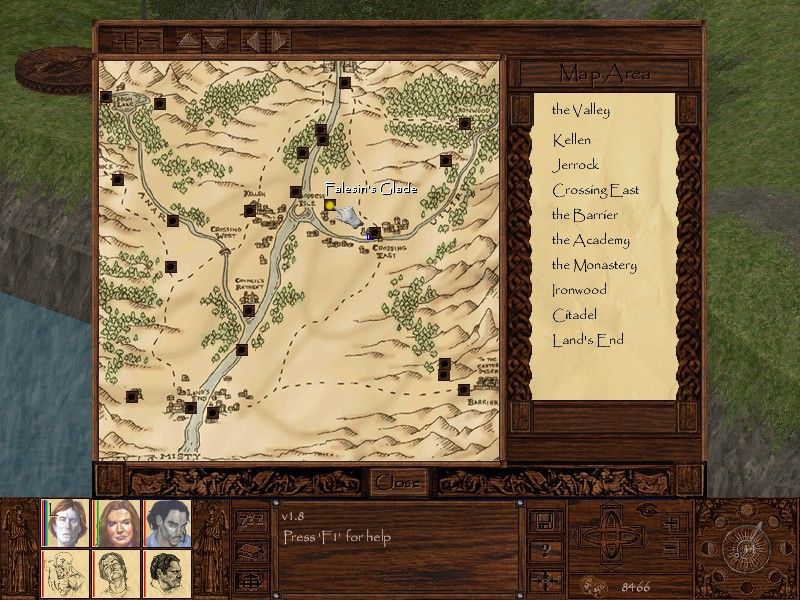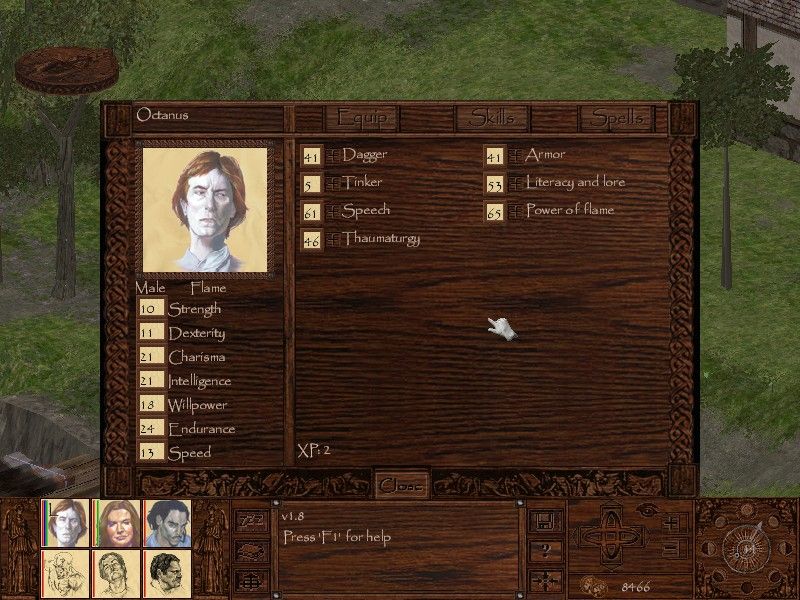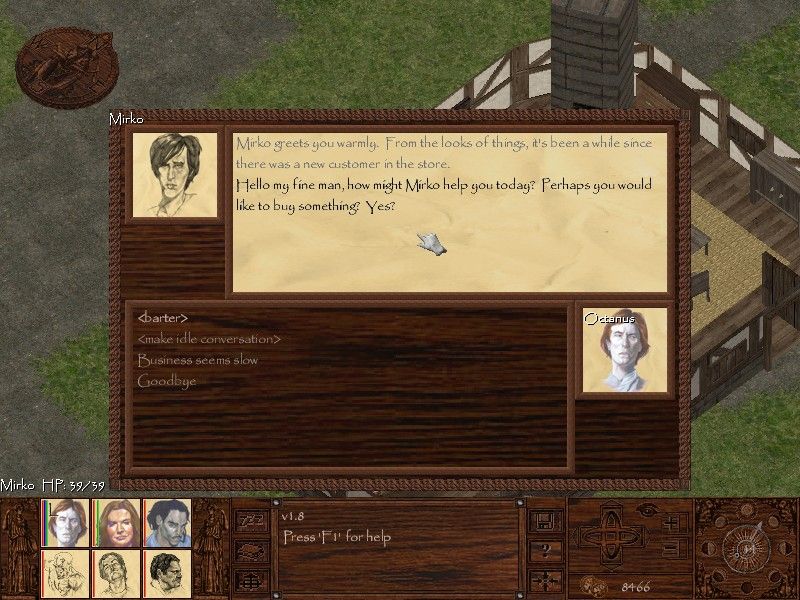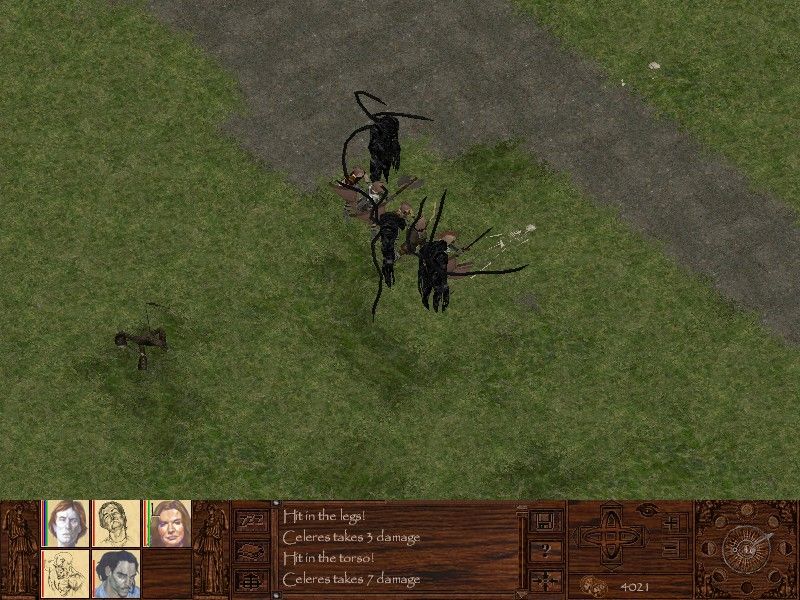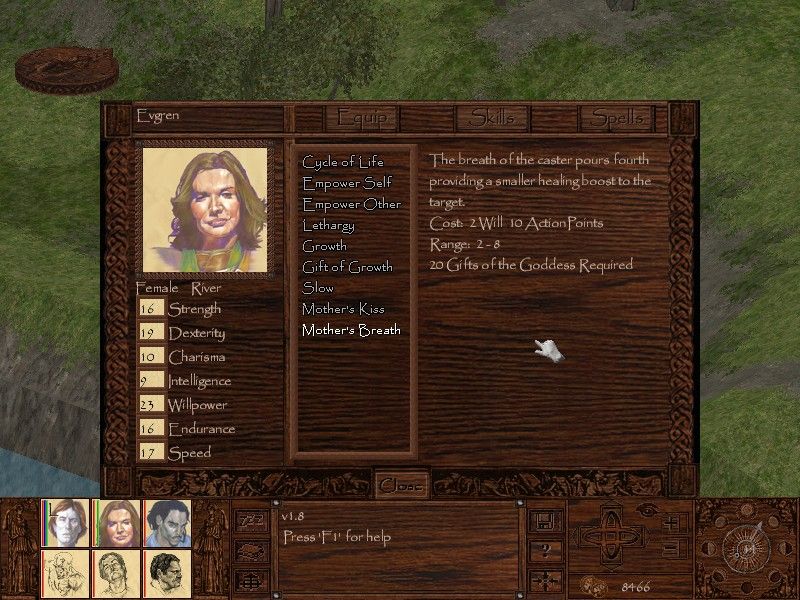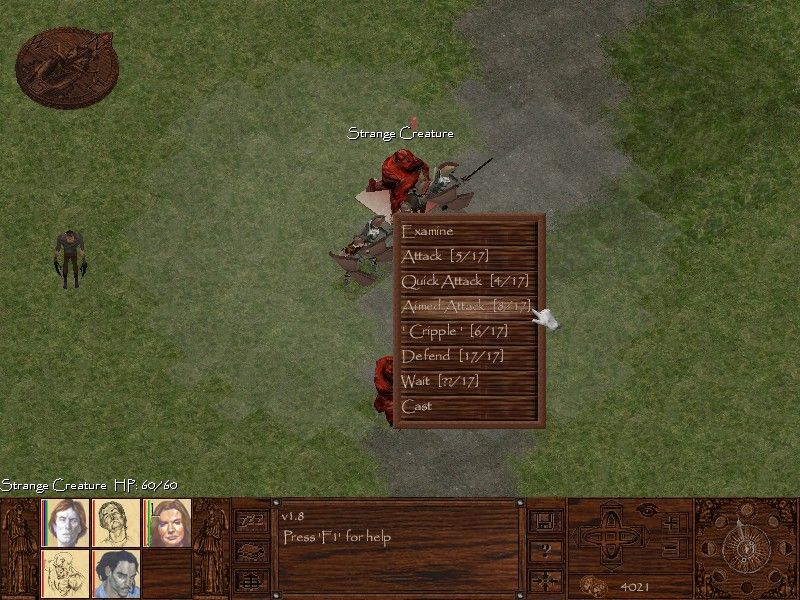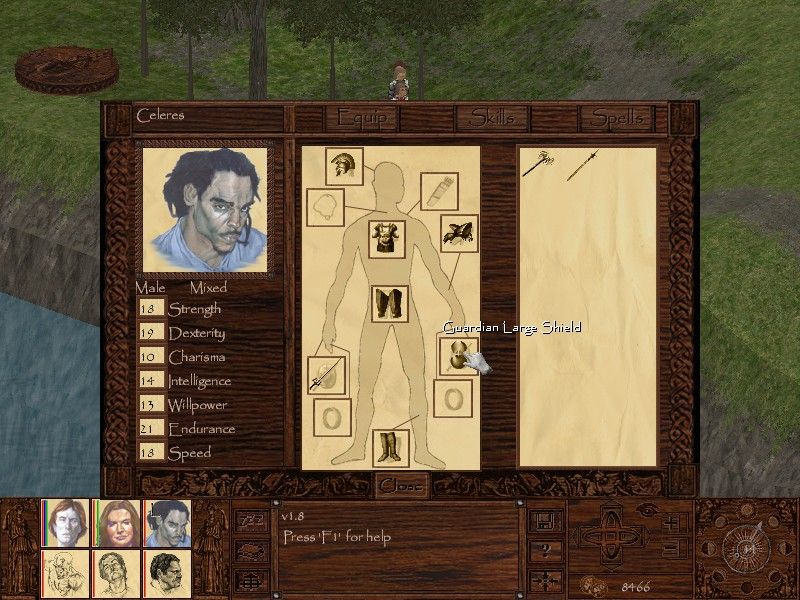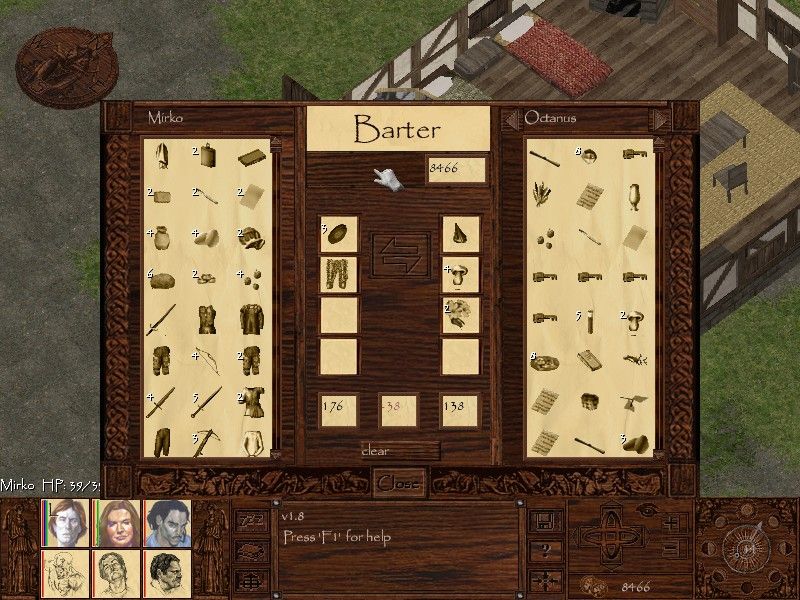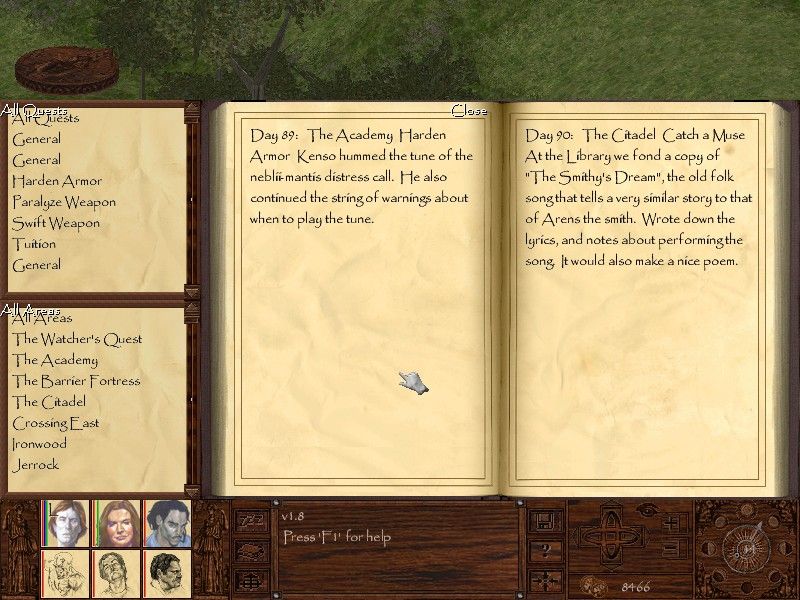Ok, so here's the review.
My reviews tend to be quite chaotic and lack focus. So this time I decided to introduce best practices from a guy who wrote hundreds of those, specifically concerning RPGs. Hence, I borrowed a rating system, the famous GIMLET, from the CRPG Addict, whose great blog you can follow
here (if anyone still doesn't know it). Hope he doesn't mind.
Prelude to Darkness (or rather: Pyrrhic Tales: Prelude to Darkness, it was supposed to be first game of a series) was published by a small team of debutants, Zero Sum Software, in 2002. However, the game was riddled with numerous bugs and glitches, so next versions kept on being released for some more years. In the meantime the devs decided to offer their game as freeware (due to bugs and lack of publicity it was not selling too good anyway) in order to generate interest for future, hopefully more commercially successful expansions/sequels. This effort however failed. Zero Sum stopped supporting the game at version 1.8, which, while packed with content, was still very unstable, prone to freezes and ctds. Despite creating something original and fresh, even for an epoque fillled with good RPGs, the devs were unable to fully realise their vision. Thus, they finally moved on and PtD is the only game we got from a planned series. A pity, because as you will see, many elements of this game show a striking level of ability and competence. It is a true pity our beloved genre lost those lads.
CRPG Addict's GIMLET is a nice and structured system of rating CRPGs according to 10 categories. In each category, up to 10 points can be earned. The final score is thus on a scale of 1-100. So, let's see how it goes.
1. Game World. Creators of PtD managed to shape a vast well-defined and believable dark fantasy setting of the Valley. During the campaign we get to know it's troubled history and uncover some ugly mysteries. Most of them through quests, some through lore dumps (fortunately, not very frequent), others through optional books you may read in the Library of House Leit. Most of the time however you are not attacked by walls of text. The world simply draws you in and invites to explore it. It is quite sizeable, with two big cities, several smaller settlements, places like the Thaumaturgic Academy, the Monastery of the Charred Ones, the Isle of the Goddess, lots of caverns and several dungeons. A pity there are not many hidden places to visit outside the main "points of interest" in the overworld. Despite the fact you have a map that allows you to quick travel like in Fallout, you also have a contineous world, like in Arcanum. You can basically walk from one town to another. Unfortunately, such a trip is usually a waste of time, with few interesting encounters. So, you better use the map. Still, the main places are fascinating enough to keep your interest and make you push on to see and learn more. This is certainly a strong category for the game.
Score: 8
BTW, here is the worldmap (all screenshots come from Mobygames, regretfully, I did not take my own:
2. Character Creation and Development. Here's where the game shines. Upon starting the campaign, you create a party of three. The system is basically classless, but provides you with three "bloodlines" (races of this world: People of the River, Children of the Flame and Mixed), and more than a dozen origins (professions - each has stat requirements, like in Wizardry, but also allow you to choose a different number of skills from the combat and non-combat lists). Later you can develop your characters as you see fit. The statistics are: Strength, Dexterity, Charisma, Intelligence, Willpower, Endurance and Speed. And frankly speaking, most of them are important. There is a wide selection of weapon specialities, rogueish abilities, magical talents and social skills. For example, to have a journal at all, you need at least one character with literacy and lore, who will write it. In order to trace footprints, you need nature. To earn money in taverns, music etc. etc. There are no experience levels. The skills raise when you use them, but upon solving quests your party is also rewarded with a number of skillpoints you may distribute according to preference. When certain thresholds of a skill are reached (usually 30 and 50) the associated stat also increases. Which is vital, because there are no other ways to permanently increase stats. Weapon specialities also have their own thresholds (20 and 40) which provide the warriors with alternative attacks. While it is wise to distribute most of the available skills among your three heroes, it is not obligatory: later you'll be able to fill the remaining three slots with people you meet during your travels. There are many candidates for party members, so you can pick and choose, searching for the optimal combination. All in all the character creation allows you to craft interesting heroes and their development feels good and is truelly rewarding.
Score: 9
Here's a character sheet:
3. NPC interactions. Along your journeys you meet a lot of interesting characters: agents of the Watcher (the elusive peacekeeper of the Valley and your employer) and of Darkness, peasants, soldiers, hunters, priests, politicians, heroes and villains, allies and enemies. Sometimes your decisions will shape who's who. Those NPCs provide worldbuiding, lore, questlines, provide training, riddles, hints. They often have a rich background and dark secrets that are waiting to be uncovered. Interacting with them will provide you with well written dialogue and lots of roleplaying opportunities. Also, there are some very basic NPC schedules implemented. They work during day, sleep during night, some of them socialize in a tavern in the evening.
Score: 8
I know, not the best example of rich dialogue options, alas Mobygames did not provide anything better:
4. Encounters and foes. Here's where the problems begin. Despite the fact you fight a lot in PtD - there is no "pacifist path" through the game, the combat encounters are not really that interesting. There is a limited number of enemies - several wild animals (dogs, bearlike hulks, insectoids, large birds, water dragons), several magical creatures (golems, nightmarish servants of Darkness) and humanoids (people, cavedwellers). Few of them have any special abilities. At least some people use projectile weapons. There are very few enemy spellcasters in the game. Mostly you or your allies will be the ones to use magic. So the combat quickly becomes repetitive and tedious, even if still it requires some tactics. The difficulty curve is a bit bizarre. The initial battles are very difficult and nail-biting, later it becomes a cakewalk. Until a certain point, when the monsters of Darkness appear and it becomes difficult again - but not very nail-biting, mostly you just cut through strong armor and lots of hp. All in all, a lost opportunity. Noncombat random encounters mostly consist of travellers you meet along the road. Sometimes you may trade with them.
Score: 4
Here's a party ambushed by Lovecraftian monstrosities:
5. Magic and combat. Despite poor encounter design and limited catalogue of enemies, the combat system is actually quite solid. It's turn-based with full party control (sometimes there are also allies, who are controlled by AI). The initiative and movement points are governed by Speed. After every action another character has an opportunity to act. If you have a fast hero, he or she may act several times during each turn - but those actions will be separated by actions of others, friends and foes. It's a smart mechanism which works very fine. PCs have numerous attack techniques, depending on the weapon they use and the level of appropriate skill. A pity those mechanics were not paired with more interesting combat situations.
There are three schools of Magic:
1. Gifts of the Goddess, which is absolutely mandatory and consists of healing, buffing and debuffing spells. If you don't have a healer or two in your party, you will suffer and pay through the nose for healing potions and salves.
2. Flame. Mostly offensive spells. IMO not very useful. You usually do more damage by swinging a sword. My Guardian was an able fighter and Flame magician, but I usually forgot about his fireballs and just cut through my enemies.
3. Thaumaturgy - enchanting weapons and armor, sometimes with better stats, sometimes with interesting abilities, like paralizing. Interesting, but the enchantments only last for a day. After playing with it for a while, I rarely used it.
Score: 7
Here are some useful spells from the Gift of the Goddess school:
Potential actions in combat (not a full list, by any chance):
6. Equipment. Lots of stuff to collect, especially when it comes to weapons, clothes and armor (which consists of 5 parts: helmets, body armor, pants, gaunlets and boots and provide damage reduction for the price of reducing speed). You will be upgrading the equipment of your party until the very end of the game (unless you go to the Barrier Fortress first and buy the best magical weapons from the shop there, but it is not so easy - check the economy section). When it comes to loot, the game is especially generous with magical daggers. They are plot points, quest rewards, you find them on the bodies of fallen foes. So, at least one character shoud be able to use, or even better, double-wield them. Unfortunately, the game is stingy with special ammo types. Sure, you can buy three different types of arrows and three different types of bolts from the shops... but during my whole campaign I only found 1(!) poisoned arrow. Also, there seem to be no magical armor, except for several helmets. There is magical jewelry however. PtD does not offer alchemical abilities or opportunities to craft items (with the exception of several quests, where you craft a quest-related item from some reagents).
Score: 7
The inventory sheet. The inventory of my lead character was usually more cluttered, due to abundance of quest and flavour items.
7. Economy. PtD manages to pull of this element really fine. You never swim in cash and sometimes really have to rely on those meager earnings from playing music in taverns, to pay for a warm bed and a meal for the night. At the end of the game I managed to amass about 4800 drachs (the currency of the Valley), which was quite a lot... but when I restocked my archer and crossbower with ammo, expecting a hard and bloody endgame, I was down to 3500. If you don't invest in Gifts of the Goddess you will also need to buy lots of healing potions and salves. And if you do invest, still you can buy many buffing potions. Weapons and armor cost too. So there is always something to look forward to buying. You earn money from certain quests, but even more from looting the bodies of humanoid enemies. Also, due to the relative scarcity of resources, barter skill becomes more useful than in say, Fallouts.
Score: 8
Barter screen:
8. Quests. Simply put - very good. The quests are interesting, diverse and usually offer several ways of solving them. They force you to use your brains, investigative skills and search for creative solutions. Sometimes they also offer a moral dilemma or two. There is no quest compass here, and the journal is written in a way to provide only the lightest of clues. Quests push the narrative forward and provide a lot of incentive to continue, despite other problems of the game.
Score: 9
The quest journal. Don't forget to choose "Literacy and lore" skill for one of your PCs, or you will not have one!
9. Graphics, sound and interface. As you see from the screenshots, PtD is not a pretty game. The visuals are functional, but nothing more. It's a pity the creators of the game decided to use early 3d graphics, they could achieve much more with 2d. And there would not be so many instances of missing or terribly pixelated textures. Music is nice and atmospheric, but monotonous and repetitive. Ambient sounds are okayish, but the sounds of battle hurt the ears. However the true culprit is the interface. There are so many issues with it I don't know where to start. It's cluttered, unintuitive and sometimes completely retarded. Example 1: you can open the map with an "m" button, but you have to click "close" on screen to get rid of it. Escape or any other button does not work. Example 2: outside combat you can turn on main menu of the game with Escape button. However during combat it stops working - you have to click the disc icon on screen (not to mention the disc icon is quite unfitting in this wooden layout). The journal does not work as intended - you can only change pages, but you cannot filter the informations by quests or locations - even though the option seems to be there.
Score: 3
10. Gameplay. I'd love to say it's great, but there are some serious problems with it. First, the phantom menace of constant instability. There are techniques you can learn to avoid most ctds (don't move the camera too fast in caverns, mostly keep your party on the screen) or to mitigate their effect (put autosave to "once a minute", save often, especially in caverns and after combat). Still, you will encounter freezes, that force a restart of computer with troubling regularity. Then, there is a feeling that some parts of the game are simply unfinished. After braving the wilderness you come upon a hidden shack in the middle of nowhere. You enter it, see that it is not ruined, obviously someone lives there... but there is noone. The devs forgot to place someone there? Most likely. Or even if people are there, they have one line of boring dialogue. So, no rewards for careful exploration. The dungeons are often tedious and unimaginative. The biggest problem of exploring the sewers under the Barrier Fortress is... atrocious pathfinding. However, if you ignore all those things, and are lucky enough to avoid script errors and broken questlines, you get a fascinating, non-linear, moderately hard adventure in the best tradition of Fallout and Arcanum. It is certainly a ride worth taking, but the barrier of entry might be too high for most people.
Score: 7.
So, where does it leaves us? My final rating for PtD is 70/100.


You'd say not bad and I'd agree. It's more than I would grant to most of the RPGs published today. However, at the same time this rating is quitel tragic, when you consider what Prelude to Darkness could have been. The devs in Zero Sum Software had tons of talent and sheer love for the genre. If they had more resources, manpower, advertisement budget and propably time, they could have crafted a masterpiece. What we received is a flawed gem. And yet, I still recommend it to every true CRPG fan out there. It is worthy of your attention.
Edit: if you are asking, what sort of a time investment PtD needs, I'd say it's a rpg of medium length. I got to the ending slides in 41 hours, though I did not complete all the quests and ignored at least one dungeon. You propably could squeeze 45 hours of quality fun out of it.

. Still this is the worst made of them all. Even ascension to the throne with its blue screen of death is not that fucked up. Yeah also i know my shit and have no anti-virus malware. The game is just coded by total retard.























